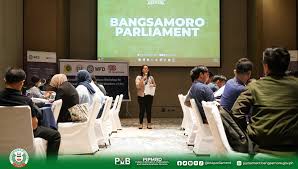Marcos signs bill postponing Bangsamoro elections till October
The first election in Mindanao’s war-torn Muslim-majority autonomous region was set to take place along with other national and local elections on 12 May. Funding for the vote and candidacy procedures remain unresolved issues. Meanwhile, violence in the region is on the rise.
Manila (AsiaNews) – Philippine President Ferdinand Marcos Jr. signed the law postponing the legislative election in the Bangsamoro Autonomous Region of Muslim Mindanao (BARMM), dashing for now hopes of a long-awaited vote in the country’s tormented south.
Commission on Elections (Comelec) Chair George Garcia made the announcement at a press conference outlining an agreement signed with malls and telecommunications companies for the upcoming midterm elections.
Rappler, a Philippine online news website, reported that Malacañang Palace[i] confirmed that President Marcos Jr. had signed and into law the bill that postpones BARMM elections.
Republic Act No. 12123 stipulates that voting for BARMM, originally scheduled for 12 May 2025 will be postponed to 13 October. The decision was recently ratified and approved in the bicameral conference committee report by the Senate.
Voting in Bangsamoro will thus not take place at the same time as the rest of the country, which will vote on May 12 for national and local elections.
“The next election shall be held and synchronized with the 2028 national elections and every three years thereafter,” the law states.
Though confirming the law’s passage, Garcia said that the commission needed to see the precise wording of the law, as he was concerned with procurement amid the new timeline.
Funding for the Bangsamoro election and the procedures for filing the certificates of candidacy remain outstanding issues.
Noting how procurement takes two to three months, Garcia warned that the timeline of printing ballots by July to August, and shipping out all election paraphernalia by September to make it in time for the 13 October election will be “tight”.
Only when the law signed by President Marcos Jr. is published will all the details be known.
The Moro Islamic Liberation Front (MILF), which leads the current BARMM government, recently said that a postponement would allow for better preparation.
In February 2019, then-President Rodrigo Duterte appointed MILF leader Al Hajj Murad Ebrahim as BARMM’s interim chief minister.
Since then, the rebels – who engaged in a brutal fight for autonomy, with 150,000 dead since the 1970s – have become guarantors of peace and stability in the Muslim-majority territory on the island of Mindanao.
The BARMM was set up after the ratification of the Bangsamoro Organic Law (BOL), which followed negotiations between the central government and the MILF and Murad.
Until legislative elections are held, Murad and the 80-member Bangsamoro Transition Authority, which currently governs BARMM’s five provinces, remain in power.
A referendum in two rounds (21 January and 6 February 2019) approved the creation of the new region, which includes the provinces of Lanao del Sur, Maguindanao, Basilan, Sulu and Tawi-Tawi, plus the cities of Marawi, Lamitan, Cotabato and 63 villages in North Cotabato.
However, divisions emerged soon after. The decision to pick the MILF, an expression of the Maguindanao ethnic group, to lead the three-year political transition phase fuelled resentment in other Islamic ethnic groups, such as the Tausug, who prefer a federal structure, and the Maranao.
Local Christians are also afraid, especially over religious freedom, even if Catholic leaders have expressed support for the autonomist project, calling the BOL “the last concrete chance for a just and lasting peace in Mindanao”.
The legislative assembly of the new autonomous region will include 40 representatives of regional parties, 32 district representatives and eight sectoral representatives.
Another major concern is the region’s instability. According to the Council for Climate and Conflict Action Asia (CCAA), local conflicts have increased by 24 per cent, or 2,570 incidents in 2024, the worst figure in seven years.
This follows a steady rise in violence in the region since 2021, the CCAA said at a news briefing in Manila on Thursday.
“The upward trajectory is expected to continue with no significant action taken to address illicit weapons and strengthen governance,” noted Phoebe Dominique M. Adorable, CCAA programme manager.
[i] Official residence and workplace of the Philippine president.
31/10/2023 15:44
06/05/2022 13:35







.png)










